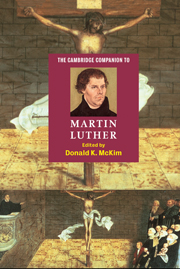18 - Luther in the worldwide church today
from Part IV - Luther today
Published online by Cambridge University Press: 28 May 2006
Summary
THE LIBERATION OF MARTIN LUTHER FROM HIS CAPTIVITY
It is obvious that for centuries after the Reformation and for the majority of his followers Martin Luther was not a theologian of the worldwide church. Rather, already in the seventeenth century, in Lutheran Orthodoxy, he was considered to be the father, founder, and foremost – if not normative – theologian of the Lutheran church and tradition. Luther became the Lutheran par excellence. He was not only the Lutheran, but the German Lutheran, and as a central figure and cornerstone of German Lutheran identity his critical and even polemical position over against the Roman Catholic and Reformed traditions became prominent while his vision of the universal church was forgotten or ignored.
Throughout the ensuing nearly four centuries after his appearance as a reformer, Luther was owned and reinterpreted, misrepresented and misused as the chief ideologist and hero of Lutheran Protestantism. During the Enlightenment period of the eighteenth century, Luther was seen as the Christian hero, who had liberated Protestant Germany from the dictates of a foreign power, the papacy in Rome. He had brought freedom from the yoke of tradition and the bondage of conscience. In the nineteenth century Luther was praised as the grandiose representative of the German national spirit, while in the twentieth century at the time of World War II such distorted images were replaced by a sharply contrasting one when some Anglo- Saxon writers considered Luther as initiator of a movement of authoritarian ideology that led, by way of Bismarck, finally to Adolf Hitler’s Nazism.
- Type
- Chapter
- Information
- The Cambridge Companion to Martin Luther , pp. 289 - 303Publisher: Cambridge University PressPrint publication year: 2003



